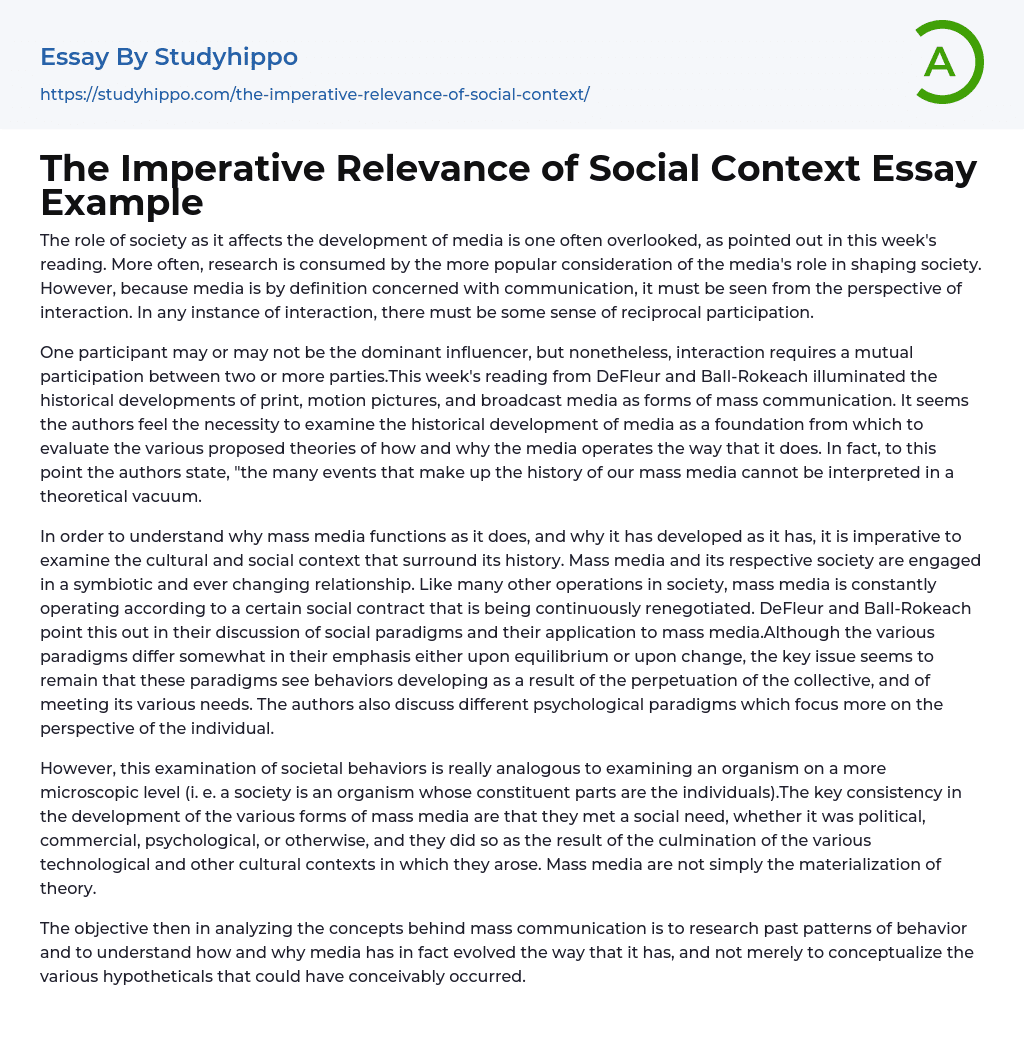The role of society as it affects the development of media is one often overlooked, as pointed out in this week's reading. More often, research is consumed by the more popular consideration of the media's role in shaping society. However, because media is by definition concerned with communication, it must be seen from the perspective of interaction. In any instance of interaction, there must be some sense of reciprocal participation.
One participant may or may not be the dominant influencer, but nonetheless, interaction requires a mutual participation between two or more parties.This week's reading from DeFleur and Ball-Rokeach illuminated the historical developments of print, motion pictures, and broadcast media as forms of mass communication. It seems the authors feel the necessity to examine the historical development of media as a foundation from which
...to evaluate the various proposed theories of how and why the media operates the way that it does. In fact, to this point the authors state, "the many events that make up the history of our mass media cannot be interpreted in a theoretical vacuum.
In order to understand why mass media functions as it does, and why it has developed as it has, it is imperative to examine the cultural and social context that surround its history. Mass media and its respective society are engaged in a symbiotic and ever changing relationship. Like many other operations in society, mass media is constantly operating according to a certain social contract that is being continuously renegotiated. DeFleur and Ball-Rokeach point this out in their discussion of social paradigms and their application to mass media.Although the various paradigms differ somewhat in their emphasis either upo
equilibrium or upon change, the key issue seems to remain that these paradigms see behaviors developing as a result of the perpetuation of the collective, and of meeting its various needs. The authors also discuss different psychological paradigms which focus more on the perspective of the individual.
However, this examination of societal behaviors is really analogous to examining an organism on a more microscopic level (i. e. a society is an organism whose constituent parts are the individuals).The key consistency in the development of the various forms of mass media are that they met a social need, whether it was political, commercial, psychological, or otherwise, and they did so as the result of the culmination of the various technological and other cultural contexts in which they arose. Mass media are not simply the materialization of theory.
The objective then in analyzing the concepts behind mass communication is to research past patterns of behavior and to understand how and why media has in fact evolved the way that it has, and not merely to conceptualize the various hypotheticals that could have conceivably occurred.
- Perseverance essays
- Expressive essays
- Character Traits essays
- Apology essays
- Compassion essays
- Academia essays
- Higher Education essays
- Language Learning essays
- Studying Business essays
- Education System essays
- Study essays
- First Day of School essays
- Scholarship essays
- Pedagogy essays
- Curriculum essays
- Coursework essays
- Studying Abroad essays
- Philosophy of Education essays
- Purpose of Education essays
- Brainstorming essays
- Educational Goals essays
- Importance Of College Education essays
- Brown V Board of Education essays
- The Importance Of Higher Education essays
- Online Education Vs Traditional Education essays
- Academic And Career Goals essays
- Academic Integrity essays
- Brown Vs Board Of Education essays
- Distance learning essays
- Technology in Education essays
- Vocabulary essays
- Writing Experience essays
- Importance of Education essays
- Early Childhood Education essays
- Academic Degree essays
- Academic Dishonesty essays
- School Uniform essays
- Academic writing essays
- Cheating essays
- Bachelor's Degree essays
- MBA essays
- College Life essays
- Grade essays
- Diploma essays
- Phonology essays
- Sentence essays
- Filipino Language essays
- Pragmatics essays
- Millennium Development Goals essays
- History Of Education essays




